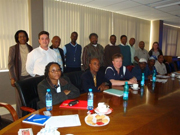The Global Agreement with Nampak works!

The 4th meeting of the Nampak@UNI working group and the 3rd annual meeting with the company took place in Johannesburg, on 8 and 9 July 2009 respectively. Union representatives from six (6) Countries namely UK, Nigeria, Zambia, Zimbabwe, Mozambique and South Africa attended the meetings.
“We are in difficult times, but this Global agreement is giving us the chance to be all together around the table and to discuss how to face the crisis”, said Lemmy Mokoena (CEPPWAWU, South Africa), chairperson of the Nampak Working Group.
The representatives of the Nampak@UNI working group presented to the company their concerns and proposals as discussed at the working group meeting. This included the problems that the workers are facing in the UK and Nigeria. Management gave a commitment that they will follow up on all the issues raised, in particular on the situation at the Leeds (UK) plant.
“In our plant we are suffering the consequences of the global recession”, reported Glenn Jackson (UNITE, UK). “We accepted that the situation is difficult, but we want to make sure that we count with all the information that we need if we have to accept decisions that will affect very much the workers and their families”. Delegates from UNITE and CEPPWAWU (South Africa) reported that the global economic crises affected them and this resulted in plant closures, below inflation proposed salary increments (South Africa) and downward variation in conditions of employment and redundancies in the UK.
However, Collective Bargaining processes varied amongst the countries. The delegates from Zambia, Nigeria and Mozambique reported that the plants where they organize are doing fairly well financially and as a result they signed agreements that were above 15%. David Mwaba, from the Zambian Graphical Union informed the working group of the successes they had in negotiations as a result of the Global agreement. This included the signing of a 25% pay rise, health and safety agreement, conclusion of a HIV/Aids policy and a marked improvement in the behavior of management towards employees
Delegates also reflected on union density at the various plants organized by UNI affiliates. Union density at the plants ranged from 60% to 100%. The working group members concluded that the high union membership gave them leverage in their dealings with the company. The meeting agreed that part of the future plans should include the recruitment of affiliates in countries such as Malawi, Swaziland, Namibia, and The Netherlands, encouraging them to be part of the network.
Fezekile Tsiqi, Group Human Resources Director, welcomed all delegates to the meeting as well as representatives from Shoprite Checkers, who attended as observers. “It’s very important for us to have a representative of Shoprite at this meeting”, said Keith Jacobs, UNI Africa. “Our relationship with Nampak shows that a global agreement is a win-win equation, beneficial for workers and employers.”
The Company agreed that they will consider the groups proposal on the extension of training on company policies beyond the borders of South Africa.
Fezekile, on behalf of Nampak, gave a commitment that the Company will continue with their efforts to ensure good industrial relations at all Nampak plants and to this end will strengthen their coordination with human resource departments from head office.
For more information, please contact keith.jacobs@uniglobalunion.org

